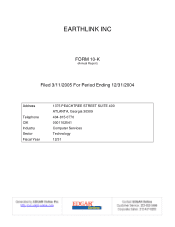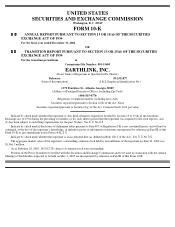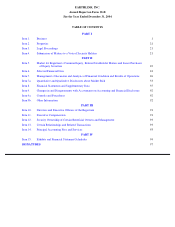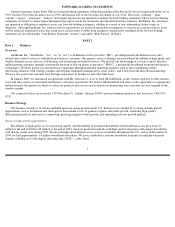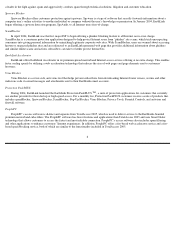Earthlink 2004 Annual Report Download - page 11
Download and view the complete annual report
Please find page 11 of the 2004 Earthlink annual report below. You can navigate through the pages in the report by either clicking on the pages listed below, or by using the keyword search tool below to find specific information within the annual report.
We could also be affected by any change in the ability of customers to reach our network through dial-up telephone connections without
any additional charges. The FCC has ruled that ISPs are enhanced service providers and are thus exempt from access charges that apply to
traditional telecommunications companies. Local telephone companies typically assess charges on long distance companies for the use of the
local telephone network to originate and terminate long distance calls, generally on a per-minute basis. We could be adversely affected by any
regulatory change that would result in the imposition of access charges on ISPs because this would substantially increase the cost of using the
Internet.
State public utility commissions generally have declined to regulate enhanced or information services. However, some state commissions
continue to review potential regulation of these services. There can be no assurance that state regulatory authorities will not seek to regulate
aspects of these activities as telecommunications services.
Broadband Access
We purchase last mile broadband access from incumbent local exchange carriers (“ILECs”), competitive local exchange carriers
(“CLECs”) and cable providers. The term “last mile” generally refers to the element of telecommunications networks that is directly connected
to homes and businesses. ILECs are required by current law to make last mile access available on a non-discriminatory basis to ISPs like
EarthLink, although there are currently regulatory proposals which could change this requirement. Cable providers, for the most part, have not
been required to make last mile access available to ISPs like EarthLink. However, an October 2003 ruling by the U.S. Court of Appeals for the
Ninth Circuit held that the provision of cable broadband Internet services includes a
“telecommunications service.” This ruling may ultimately
require cable providers to make last mile access available on a non-discriminatory basis to ISPs; however, we cannot predict the outcome of a
pending Supreme Court review of this decision. We are also unable to predict the outcome of any further legal, regulatory or legislative
proceedings or the impact of any such regulations or rulings on our business and operations. Time Warner Cable makes last mile access
available to EarthLink and other ISPs as a condition of the AOL-Time Warner merger and after taking over six of Time Warner Cable’s
markets, Bright House Networks continues to make access available. EarthLink also offers broadband Internet access over cable to Comcast
customers in the Seattle and Boston area markets.
In August 2003, the FCC issued its UNE Triennial Review Order which, among other things, eliminates line sharing over a three-year
transition period. Line sharing allows CLECs such as Covad to purchase the High Frequency Portion of the Loop (“HFPL”) from an ILEC for
less than the cost of purchasing an entire line. Purchasing the HFPL as a separate Unbundled Network Element (“UNE”) allows Covad to offer
wholesale DSL services to EarthLink on a cost-effective basis. Various parties, including Covad, appealed the FCC’s Order. In March 2004,
the U.S. Court of Appeals for the District of Columbia (DC) Circuit overturned portions of the FCC’s Order but upheld the elimination of line
sharing. In August 2004, the FCC issued interim rules regarding UNE availability but did not include line sharing. The FCC voted on
permanent rules regarding UNE availability in December 2004 and released its written order in February 2005, but this order did not address
line sharing. EarthLink has a motion for reconsideration on line sharing still pending before the FCC.
Covad is one of our largest providers of wholesale broadband access. In April 2004, Covad entered into a three-year line sharing
agreement with Qwest. In September 2004, Covad reached an agreement with SBC to make new line sharing arrangements available through
September 2005. In December 2004, Covad announced a four-year line sharing agreement with Verizon. However, if Covad is unable to
continue to obtain reasonable line sharing rates, its wholesale DSL offerings for new customers may become uneconomic or it may cease
selling wholesale broadband services for new customers. In either event, we may use other wholesale broadband providers’
networks, including
ILECs’ and/or cable providers’ networks, for new subscribers. While we currently have contractual arrangements with other
8

